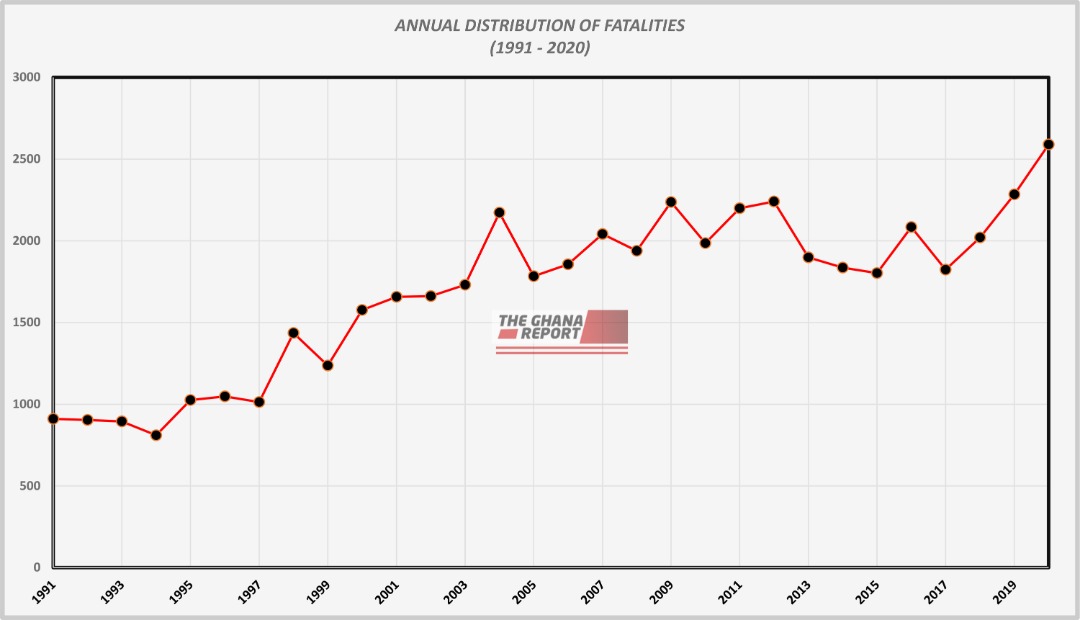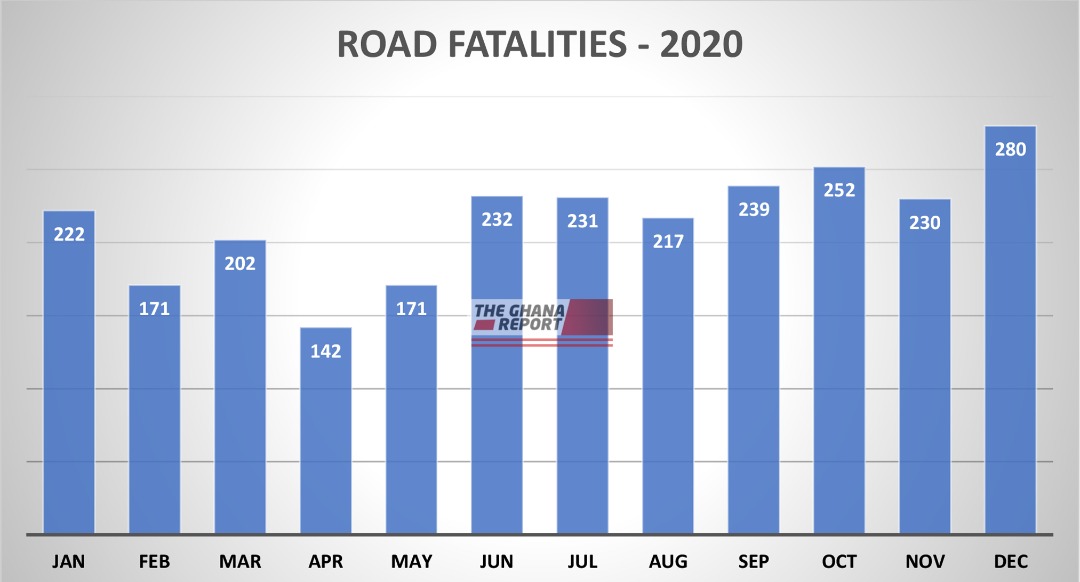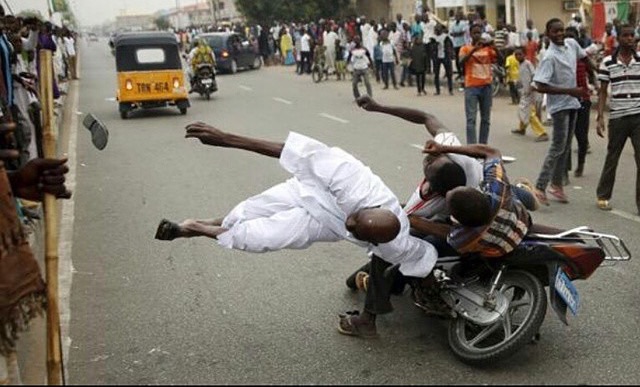Motorcycles push road fatalities to highest since 1991
The country recorded the highest road traffic fatalities in the last 30 years due to increasing motorcycle accidents in 2020.
Motorcycle accidents contributed approximately 40% to the total deaths in the last year.
Provisional data for 2020 showed that 2,589 lives were lost to road crash across the country despite movement restrictions due to COVID-19.
This figure represents a 13% rise compared to the 2,284 registered in 2019.
It was also consistent with high fatalities associated with election years as citizens hit the polls in December 2020.
If the data from the Motor Traffic and Transport Department (MTTD) is finalised by the National Road Safety Authority (NRSA), the 2020 deaths would be the highest in the last three decades.

Besides pedestrian knockdowns which registered a decline of 9%, all other parameters recorded a surge despite restrictions and a partial lockdown due to the COVID-19 pandemic.
These figures bring the debate on whether to legalise the “Okada business”, bringing a sharp focus on the use of motorcycles as a mode of human transport.
The debate was heightened during last year’s general elections. The two main political parties split heads on whether to legalize it or not.
Population rise and increase in the number of vehicles contribute to road traffic and these have increased over the years.
The highest fatalities within the year was in December when election campaigns and political activities peaked.
The least fatalities was recorded in April during the three-week partial lockdown to curtail the spread of the COVID-19 infection.

Breakdown of figures
A total of 14, 886 road accidents were reported across the 16 regions which was 7% higher than the 13, 877 for 2019.
Out of this, 25, 152 vehicles were involved, a 10% increase from the 22, 789 in the previous year.
Victims who suffered various forms of injuries totalled 15, 517 also a 13% rise from 13, 677 just a year ago.
Pedestrian knockdowns totalled 2,728 with 720 of the incidents resulting in deaths. This was a reduction of 9% from the 2,283 with 740 deaths received in 2019.
Motorcycles
Unlike previous years, motorcycles were involved in the most fatalities, with 1,056 deaths and 4,684 injuries from 5,684 motorcycle crashes.
A year before, there were 4,643 motorcycle accidents which contributed to 732 deaths and 3,474 injuries.
This shows a 44% rise in motorcycle deaths from 2019 to 2020.
Motorcycle classification comprises motorcycles (two-, three-, and four-wheeled), bicycles and handcarts.
Commercial vehicles
A total of 964 were lost, as well as 7,595 injuries on account of 9, 356 commercial vehicle accidents.
This represented a 10% rise in the number of vehicles involved from 8,489 in the previous year.
Bus, minibus, truck and taxi are some vehicles classified for commercial use.
Private vehicles
This group had the highest number of carnage of 10,112 vehicles, up by 5% from the 9, 657 in 2019.
Out of this came the least fatalities and injuries of 569 and 3,240 respectively.
Minibus, saloon, SUV/4×4, truck, and government cars fall under this category.
Some major incidents in 2020
This claimed 34 lives and left 50 others injured.
A total of 31 people died in an accident at Kintampo on March 10.
Twenty-nine of the people involved in the accident, including three children, got burnt beyond recognition.
Impact of accidents
WHO estimated that road traffic crashes cost most countries 3% of their gross domestic product.
Approximately 1.35 million people die each year as a result of road traffic crashes.
On average 93% of the world’s fatalities on the roads occur in low- and middle-income countries, even though these countries have approximately 60% of the world’s vehicles.
WHO indicated road traffic injuries are the leading cause of death for children and young adults aged 5-29 years.
This group forms the economic active group of the population which affects their families and the manpower of the nation.
Response by authorities
Head of Regulations, Inspection and Compliance at the NRSA, Kwame Koduah Atuahene, was concerned about the rising motorcycle accidents which have culminated in the latest death toll.
He told theghanareport.com, “over time, it has been coming up”.
He emphasised the enforcement of laws related to all forms of motorcycle use.
“The relevant traffic laws must be enforced…by the principal enforcement agency which is the police,” he stressed.
He entreated the police to devise innovative ways to ensure that motorcycle accident are curbed.
A major concerned of enforcement is the reckless use of motorcycles for carrying fare-paying passengers – a practice christened ‘okada’, outlawed in Ghana.
Why okada clampdown has been near-impossible
A big challenge confronting the fight against okada is the economic value to persons engaged in the trade.
On average, riders generate over GHC 500 cedis in returns.
Additionally, it is the primary source of transportation in areas with poor roads and hard-to-reach areas.
Places without commercial vehicles also rely on okada for movement.
Endorsement of its use by politicians, people in authority and high-profile stakeholders and public declarations in favour of okada by officials have encouraged operators to slap the law in the face.
Allegations of people in high authority giving out motorcycles for okada operations are rife even though unconfirmed.
The MTTD of the Ghana Police Service has had their share of the blame as the NRSA official insists, “The police have not put in as much fight to enforce the law”.
Head of the Accident, Emergency and Orthopaedic Department at the Korle Bu Teaching Hospital, Dr Frederick Kwarteng also holds the same view.
“The Ghana police service should up their game when it comes to okada riders in Accra. I think they have become too mild with them,” he complained.
But the MTTD have offered reasons why okada crackdown has been a daunting task for them.
Following the ban, the MTTD deployed countless strategies to ensure enforcement, despite being “laborious and difficult”, Head of Education Research and Training at the Motor Transport and Traffic Directorate (MTTD) of the Ghana Police Service, Superintendent Alexander Obeng, told theghanareport.com in the past.
Perhaps the primary challenge of the law enforcement officers is the acquisition of evidence of fare payment from a passenger to an okada rider. Inability to justify commercial against approved private use restrains arrest. Without evidence, offenders cannot be prosecuted, and they go scot-free. At best, they are fined, but offenders could still challenge the police in the face of the unavailability of proof.
Among the tactics was the roll-out of swoops which the cops still do to date. For example, the MTTD arrested some 23 okada riders, of whom 20 were fined between GHC600 ($252) and GHC1,000 ($420) each in 2013.
Another way of fighting the menace was sting operations. Police officers would dress in mufti and engage the service of okada operators. The destination would be a location with a team of other cops to apprehend the rider at the point where the disguised officer attempts payment.
But this “proved very dangerous for the traffic police officer because we anticipated a situation where, in the course of struggle or getting to know that the one behind the pillion is a police officer, the likelihood of dangerous riding can endanger lives,” Superintendent Obeng narrated.
It is also at the benevolence of the one who used the services to own up and admit that he or she is a fare-paying passenger, he disclosed.
However, he maintained, “If we get evidence, we will then proceed to court”.
“It looks as if the police is overwhelmed at his duty point,” Superintendent Obeng noted. “We are in for an emerging phenomenon which goes beyond traffic policing to a national security issue.”
His men/women, therefore, look for private motorcycle registration, the licence of the rider, motorcycle insurance and use of protective gear (riding suit, helmet etc.).
Bloody clashes between Okada operators and law enforcement agencies have emerged, leading to death, in some instances.
Okada becomes a major debate in the 2020 election
John Dramani Mahama said the use of motorcycles and tricycles as a kind of taxi is a source of jobs for the youth that must be acknowledged.
It was a welcome call for riders but the government rejected it and promised an alternative.
Through the Coastal Development Authority, the Bajaj Qute four-passenger quadricycles were offered to drivers and okada riders on hire-purchase for use as public transport.
You might also be interested in:
- ‘Legalize Okada’ – NPP MP Backs Mahama
- Road Crashes: 10 NDC Supporters Die In Gory Accidents In Two Months
- 222 People Died In Road Accidents In January Alone
- Fatal February: 171 Died In Road Accidents; 23% Drop From January
- Motorcycle Accidents Spike Road Fatalities For April 2020
- SPECIAL REPORT: The Okada Angels Of Death- The Big Debate (Part 1)
- SPECIAL REPORT: The Okada Queen Of Accra-The Big Okada Debate (Part 2)
- SPECIAL REPORT: The Day Two Rival MPs Agreed On Legalization -The Big Okada Debate (Final Pt)



